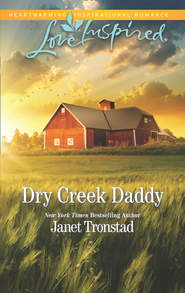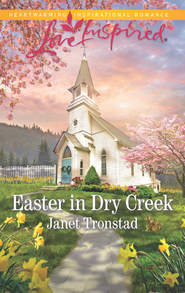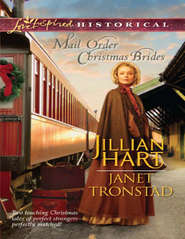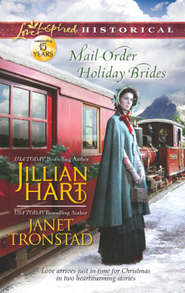По всем вопросам обращайтесь на: info@litportal.ru
(©) 2003-2024.
✖
Sleigh Bells for Dry Creek
Автор
Год написания книги
2019
Настройки чтения
Размер шрифта
Высота строк
Поля
He finally dozed off and managed to sleep for several hours before a spasm in his leg woke him. It was almost dawn and bitter cold, even inside the barn. When he stood, the cramp went away, but his leg was stiffer than usual. The rodeo doctor had said Wade would limp for a long time after his last fall, and it seemed that he was right.
“We’ll talk about all of this later,” Wade said now, keeping his voice gentle. His mother had her own wounds from the past, and he didn’t want her to worry about any of his. “Let me take you home so you can rest.”
“It won’t get any easier.” His mother pressed her lips into a severe line as her fingers gripped the edge of the metal bowl she held in her lap. “Besides, I’ve come to buy eggs. The café will surely sell me some.”
He noticed with a start that she still had her gold wedding band on her finger.
“I told you I don’t need breakfast.” He wondered if her knuckles were swollen, and that’s why she hadn’t taken the ring off. The round band had been cheap thirty years ago, and it had worn so thin since then that a wire cutter could slice through it like it was butter.
Just then, his mother’s chin lifted, and he saw a glimpse of the woman she used to be. “It’s your first morning back, and I intend to make you a sausage-and-egg scramble, like I did when you were a boy. We need to start living a normal life sometime.”
He studied his mother for a long minute before suddenly realizing she probably hadn’t even tried to remove that ring. She was stuck in the past. She didn’t understand how things had changed.
“Come to Idaho with me,” Wade urged suddenly. He’d competed in a rodeo there a couple of years ago, and he liked the state. It wasn’t Dry Creek, but it had open spaces, and it would do fine. “I’ll build us a nice, big house. One of those with a wraparound deck and maybe a sunroom just for you. Whatever you want. You like the sun.”
She shook her head and smiled slightly. “Have I told you how proud I am of you? But you need to save your rodeo winnings for your own future. I have a home that suits me fine.”
Wade knew better than to press her. No one in his family talked about their emotions with any ease, especially not with each other. “At least let me pay someone to help get the house in shape. I’ll have my hands full with fixing the barn and corrals before I need to leave.”
He’d started driving to Montana the day after he got her letter, but he didn’t plan on staying so long that he missed the National Finals Rodeo next month. If he stopped riding for too long, he’d never get back on a horse again. That tumble he’d taken eight months ago had almost killed him. Since then, the other riders had decided he’d lost his nerve, and they had started circling his championship—the one he won every year—like buzzards in the dead of winter.
“I want to do the house myself,” his mother said, dragging Wade’s mind back to the conversation. “I need to get things ready for Christmas.”
“Christmas?”
All thoughts of the championship fled Wade’s mind. “Why would you—” He stopped when he saw his mother stiffen in protest. Then he tried again in a more reasonable voice. “I mean, that’s less than a week away. Next Thursday, isn’t it? There’s no need to bother with a tree or lights or anything like that. It’s too much work. And we never—”
“I know your father didn’t celebrate Christmas,” his mother interrupted with a quiet dignity. “But this year, I thought …” Her voice trailed off; she was probably lost in her own memories.
Wade shook his head. Saying his father didn’t celebrate Christmas was like saying a rodeo bull didn’t make a good household pet. The man had been vigilant about maintaining his ban on Christmas decorations. No holiday lights were allowed. Nothing red or green or gold was to be placed anywhere. No candles or pine cones were to be left on the fireplace mantel. Why, his father had once ripped the whole December page off the only calendar in the house, just because it had a small nativity scene on it.
“You always loved Christmas,” his mother finally whispered.
Wade shrugged. His last words with his father had been angry ones spoken the day after Christmas nine years ago. “I make out fine without it.”
Holidays were like the sweet visions that came to mind when he smelled spearmint gum. They were fine for other people but not for him. “Maybe I did like it back then, but you’ve got to remember that was a long time ago.”
The argument with his father made Wade feel guilty every year when he heard the carols on the radio. Disagreements about Christmas had ruined what family he had. So now he never paused to admire a tree in a mall or a hotel. He sent no cards and got none in return. He wanted to forget all about December 25.
“You wanted to drive the sleigh. Remember?” his mother asked.
“I was just a boy.”
He no more got the words out of his mouth than the memories came flooding back, whether he wanted them to or not. He could still see that red sleigh in his mind—the one that Charley Nelson used when he hauled hay to his range cattle during the big snowstorms that came up almost every winter in the eastern part of the state. Each Christmas, the man transformed that farm sleigh into a fairy tale worthy of the most fanciful child’s dream. He painted holly sprigs on it one year and dancing elves another. And he always tacked the same string of sturdy iron bells along the sides, so people could hear it coming for miles around.
“You used to love that sleigh,” his mother persisted.
Wade could only nod. He guessed he had, at that.
He had disobeyed his father every single year to go see it. Charley used a team of horses to pull the sleigh to the church around dusk on Christmas Eve. When he rang the bells, people came from all directions to fill it with presents for the annual children’s gift drive. Then the sleigh sat there waiting while everyone walked over to the old barn at the edge of town to watch the nativity pageant. After that, Charley drove the sleigh around to deliver all the gifts.
Back then, the presents had been simple, handmade things, often wrapped in a brown grocery bag and tied with a single strip of red ribbon. No one had money for store-bought toys or fancy paper.
Wade and his brothers usually received a pair of warm mittens that Mrs. Hargrove, one of the church ladies, had knit. As hard as it was to believe now, those mittens had been enough to make Wade feel like he was a regular kid celebrating Christmas right along with all the other children in the world. On that one night, he wasn’t one of the poor Stone boys; he was the same as everyone else. Someone had given him a Christmas gift.
All those years as a boy, Wade had willingly faced his father’s wrath just to sneak into town and get the presents for him and his brothers. Charley always left the Stone family presents clearly marked on the seat of the sleigh so Wade could get them if he came early, before the pageant was finished.
Wade heard his mother sigh, and he looked over at her. He’d long since known he had been a fool to put so much stock in a day on the calendar.
“What happened to all of us?” she asked, looking at him with discouragement on her face. “Just because I went to prison, that was no reason for you and your brothers to stop believing a good life is possible.”
“We haven’t stopped—”
“Not a one of you got married while I was gone,” his mother interrupted him as though she knew what he was going to say and didn’t want to even hear the rest of it. “I always thought you’d stay in touch with Amy, at least.”
“She was just a kid back then,” Wade protested and looked away, gripping the steering wheel as he did so. He might have liked Christmas, but his biggest weakness growing up had always been Amy. Even before he’d become aware of her as a girl, he’d known she was special in some way he couldn’t define.
At first, she’d merely been underfoot, tagging along behind him, no matter whether he was helping his brothers move cattle or turning hay bales in the north pasture. His boyish pride made him complain about her being there, but his words were halfhearted. He wouldn’t have admitted it, but he was always more content when she was around. She soothed something deep inside of him.
He felt bad about not saying a proper goodbye to her before he left, but none of his friends had known what his life had been like until the trial began. Before that, he had explained away his bruises and made light of his father’s drunkenness. He had pretended his family was normal. But there was no hiding anything on the witness stand, and the Stone family problems were told and retold throughout the whole eastern part of the state. When the trial was over, it had been easier for him to climb into the family pickup and drive away, rather than face anyone with his shame.
His mother smiled. “I’m sure Amy’s all grown up by now.”
Before Wade could say anything more, another pickup eased past and stopped directly in front of the café. He recognized the old, red Ford seconds before the driver’s door opened and a woman stepped out. He wasn’t more than ten feet behind her, but he still couldn’t seem to make sense of the flash of shiny blond hair, twisted into some kind of a knot at the back of her head. A black work hat hung from her neck by a leather cord. Shapely, long legs filled out worn jeans. A heavy farm jacket swung free from her shoulders as she marched up to the café, determination in her every stride.
“It’s Amy,” his mother said, her voice blossoming with some kind of hope that made Wade want to slouch down in the seat so no one would be able to see him, even if the sun came out enough to clearly show him sitting inside his cab. Could it be? Was she still here?
He focused on the red-and-white bumper sticker on the back of the pickup. It urged everyone to vote for Garrett for the state legislature. Amy had just been learning to drive in that pickup when he’d left. He doubted she would have turned political. But then nine years had passed since he’d seen her. She could have turned into almost anything in that time.
“That’s got to be Amy Mitchell,” his mother repeated as she turned to look at him. “You can’t tell me now that God doesn’t want us in Dry Creek.”
He didn’t know how God felt about his presence here, but he was almost certain Amy wouldn’t be too much in favor of it.
“You can’t be sure that’s her,” he said, trying to hide the desperate lump in his throat.
Without warning, the picture of Amy’s face came to him. He could still remember how her eyes had looked when he’d kissed her. She’d been fifteen and he’d been seventeen. Even now, just thinking about it, he could almost smell the spearmint gum she’d been chewing.
“We need to leave,” he said to his mother.
His mouth was as dry as it had been that night. Reluctant to go anywhere after wrapping presents for the gift drive, he and Amy had been leaning against the closed back door of the church. It was one of the few times he’d been inside the church; no one in his family was a member, and he normally felt uneasy just being near the building. But on Christmas Eve, the church belonged to everyone. Or so he told himself, standing there on the porch.
Snow had started to fall. There was a light for the front door of the building, but none for the back one. Inside, people were practicing carols for the pageant. The moon was shining bright enough that he could see a single flake as it fell on Amy’s nose. She giggled as he wiped it off. And then he kissed her. He hadn’t planned it, but for a moment, he was glad he’d finally done it. He knew he’d never forget the feel of her lips on his and her soft hair falling across his hand.
Then he noticed her eyes had changed to a dark blue, almost like midnight. Her pupils were large and filled with some emotion he didn’t recognize. Probably shock. She was not the kind of girl a guy kissed on the back steps of the church. He supposed it was against the rules of the place; Amy would know about that. She was always going to church, and she obeyed all the rules.
He wanted to reassure her, but when she kept staring up at him with her big, round eyes, he didn’t know what to say. So, he said the first thing that came to mind. He said it was okay if they kissed on the steps, because he was going to marry her inside the church someday, anyway.
She was supposed to feel like that fact made the kiss more proper—surely the rules allowed for those kinds of kisses—but she turned so pale he thought she might faint. Obviously, the thought of marrying him didn’t sit well with her, so he no longer had anything comforting to say. They just stood there for a moment, both stricken, until one of the guys in his class at school, Shawn Garrett, pushed open the back door and demanded to know what they were doing.











